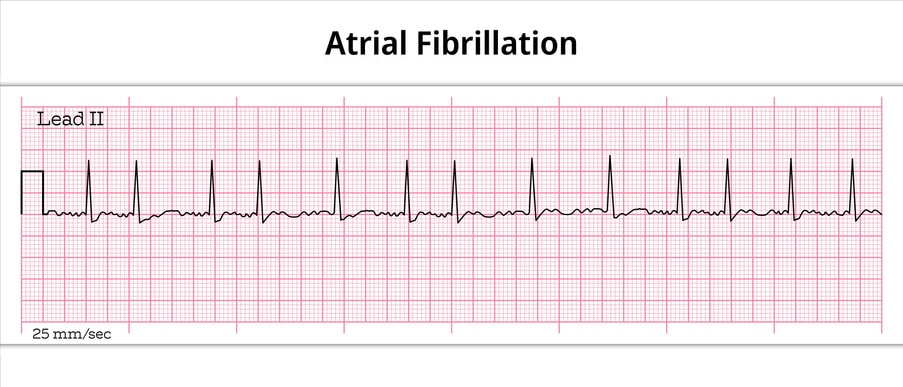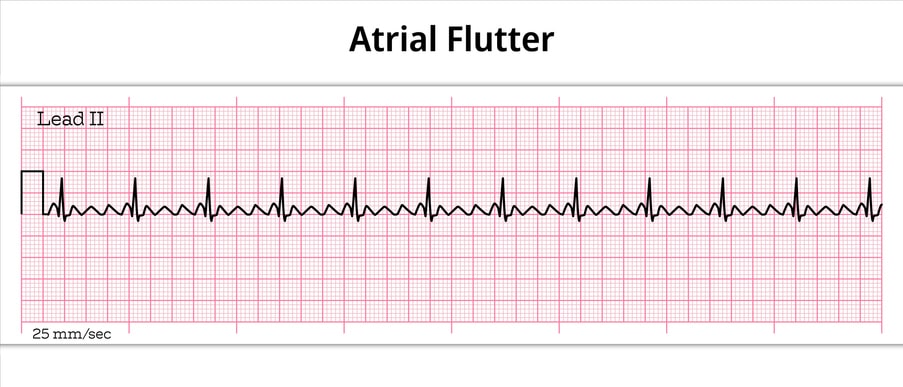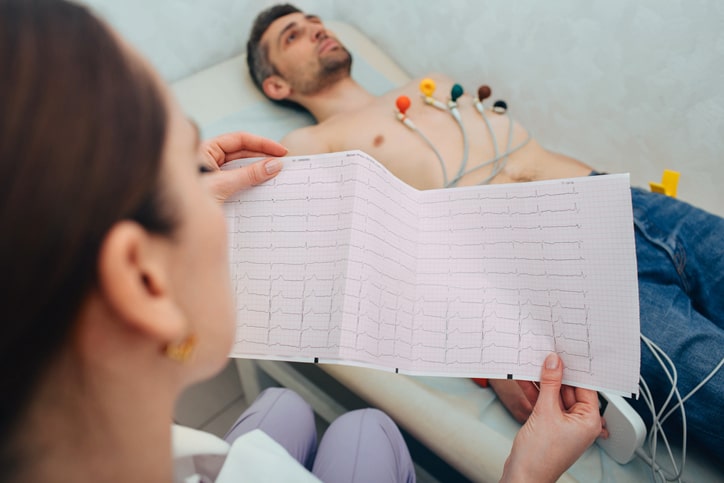Atrial Flutter & Atrial Fibrillation Treatment in Sugar Land
Atrial Fibrillation & Atrial Flutter
At Complete Cardiology Care, your heart health is our leading priority. As Sugar Land, TX’s leading cardiology center, we provide comprehensive care for various cardiac conditions, including atrial fibrillation and atrial flutter. Our professionals serve as a partner in your health journey, providing you with invaluable resources to better understand these intricate cardiac conditions.
CONTACT US

Atrial Flutter vs. Atrial Fibrillation
Complete Cardiology Care is here to guide you through the symptoms, causes, and treatments of atrial fibrillation and atrial flutter. Atrial fibrillation and atrial flutter are heart rhythm disorders that result in rapid electrical discharge patterns that compromise the contractions of the atria (upper heart chambers). While similar, these disorders vary slightly.

Atrial Fibrillation
Atrial fibrillation is a heart rhythm condition that is define by an irregular heart rate. Atrial fibrillation is the most commonly seen form of arrhythmia, affecting over 2.7 million people across the world. When left untreated, atrial fibrillation can result in life-threatening conditions, raising the risk of stroke and congestive heart failure.
What Happens with Atrial Fibrillation?
Atrial fibrillation is characterized by a rapid, irregular heart rate that compromises the body’s blood flow. Atrial fibrillation occurs when the heart’s upper chambers, known as the atria, quiver rather than contract regularly. The quivering is caused by a surplus of electrical impulses from different areas rather than one single area known as the sinoatrial node.
Irregular Electrical Impulses
As a result of a quivering atria, blood cannot properly pump into the ventricles, reducing blood flow by 10%. This may not be immediately problematic to individuals without pre-existing heart disease. However, when left untreated, these chaotic electrical impulses enter the ventricles too rapidly, leading to an elevated heart rate which can worsen with physical activity.

Atrial Flutter
Atrial flutter is similar to atrial fibrillation. In contrast to atrial fibrillation, the electrical impulses are coordinated, allowing the atria to contrast rather than quiver. However, due to atrial flutter, the atria contracts too rapidly with rates between 250 and 350 contractions per minute.
What Happens with Atrial Flutter?
With the rapid heart rate of atrial flutter, not every electrical impulse has the chance to be conducted into the atrioventricular node in order to reach the ventricles. For individuals with untreated atrial flutter, approximately every second electrical impulse reaches the ventricles, producing a ventricular rate of around 150 beats per minute.
Atrial Fibrillation Causes
Atrial fibrillation can be brought on with or without pre-existing heart conditions. Some of the leading causes of atrial fibrillation include:
- Coronary artery disease
- Disorders that compromise the mitral and/or tricuspid heart valves
- Alcoholism
- Hyperthyroidism
- Heart birth defect
- High blood pressure
Atrial Flutter Causes
Atrial flutter causes are often the same as those of atrial fibrillation. Similarly to atrial fibrillation, atrial flutter may be the result of an underlying heart condition. Furthermore, it can be linked to cardiac surgery complications. Atrial flutter causes are often associated with disorders that cause atrial enlargement, such as heart valve or blood pressure conditions.
Atrial Fibrillation and Atrial Flutter Risk Factors
There are certain risk factors associated with atrial fibrillation and atrial flutter. Individuals over 65 are more likely to develop these conditions. Furthermore, lifestyle factors—including excessive alcohol consumption, tobacco use, and obesity—can contribute to atrial fibrillation and atrial flutter.

Atrial Flutter and Atrial Fibrillation Complications
When these disorders are left untreated, individuals may face health complications. The most common health complications include blood clots in the atria and decreased heart output as a result of a rapid heart rate.
Blood Clots
With atrial fibrillation and atrial flutter, the atria cannot fully empty the blood into the ventricles. As a result, blood will begin getting caught within the atria, leading to blood clots over time. When the normal heart rate is restored through treatment or natural causes, clots may enter the bloodstream, causing blocked arteries that heighten the risk of stroke.
Decreased Heart Output
Individuals with atrial fibrillation or atrial flutter have excessive heart rates that prohibit the ventricles from filling entirely with the available blood supply. As a result, the heart begins pumping less blood (approximately 10% less). With reduced blood being pumped, one’s blood pressure will begin to fall and, in severe cases, this can lead to heart failure.
Atrial Flutter and Atrial Fibrillation Symptoms
Atrial fibrillation symptoms vary depending on the severity of the rate the ventricles are beating. For normal or slightly elevated ventricular rates, atrial fibrillation may be asymptomatic. In contrast, higher ventricular rates can lead to symptoms that include shortness of breath, chest pain, dizziness, fainting, fatigue, weakness, and rapid, uncomfortable heart beats (heart palpitations).
Diagnosing Atrial Fibrillation and Atrial Flutter
To diagnose atrial fibrillation, various tests may be pursued to gain a deeper understanding of the severity and complexity of the condition. Some of the tests used for atrial fibrillation diagnosis include:
- Physical tests
- Cardiac stress test
- Chest X-ray
- CT scan
- Blood tests
- Transesophageal echocardiogram
- Electrocardiography (ECG)
- Wearable ECG monitor

Determining Treatment
At Complete Cardiology Care, we provide comprehensive cardiology services that enable our cardiologists to determine the best course of action to ensure successful results for your atrial fibrillation or atrial flutter treatment. Based on personalized testing and monitoring, we curate tailored treatment plans that target the underlying source of your arrythmia for lasting results.
Atrial Flutter and Atrial Fibrillation Treatment Goals
When treating both atrial fibrillation and atrial flutter, there are several desired outcomes. These treatments are designed to do the following:
- Restore regular heart rate
- Control ventricular rate
- Treat the underlying cause of the arrhythmia
- Prevent blood clots and emboli
Anticoagulants and Echocardiography
Although atrial fibrillation and atrial flutter may restore on their own, most patients require medical intervention to convert the arrhythmia and regulate the heart rate. To mitigate the risk of blood clots, anticoagulants may be prescribed, or an echocardiography may be requested in conjunction with heart medication or prior to pursuing an arrhythmia conversion procedure.
Blood Clot Risk Factors
Patients without risk factors may be given aspirin prior to arrythmia conversion. However, those with risk factors that put them at a higher risk of stroke are prescribed anticoagulants. The blood clot risk factors include:
- Age (65 and older)
- High blood pressure
- Heart failure
- Diabetes
- History of stroke
- Blood vessel diseases
- Female
Slowing Rapid Heart Rates
At Complete Cardiology Care, we begin atrial fibrillation and atrial flutter treatment with methods used to regulate our patients’ heart rate and ventricular rate to promote efficient blood pumping. In order to achieve this, we may prescribe a calcium channel blocker or a beta-blocker to slow the rate of electrical impulses.
Atrial Fibrillation and Atrial Flutter Treatment Options
Depending on the severity of a patient’s atrial fibrillation or atrial flutter, there are various treatment paths our cardiologists may recommend. For patients with severe cases or those who are not reacting well to heart medication, we provide several arrythmia conversion procedures. These procedures are used to restore the regular heart rhythm.
Non-Surgical Arrythmia Conversion Procedures
Non-surgical arrythmia conversion procedures are used to reverse irregular heart rhythms. These procedures include the following:
- Electrical cardioversion to stimulate a normal heart rate
- Catheter ablation using radio waves to alleviate irregular heart tissue that may be compromising electrical impulses.
Electrical Cardioversion
Electrical cardioversion, also referred to as electrical shock is used to effectively treat heart arrythmias. The electrical shock is given at strategic periods during the heart’s electrical activity to deter ventricular fibrillation. This method is proven successful in up to 90% of patients with atrial fibrillation and atrial flutter.
Ablation Procedures
In instances where heart medication and electrical cardioversion are insufficient, ablation procedures may be pursued to diminish the atrioventricular node. During these treatments, radiofrequency waves, electrical currents, or lasers apply freezing temperatures to irregular atrial tissue using a catheter inserted into the heart.
How Ablation Procedures Work
Ablation procedures eliminate the atrioventricular node. As a result, the atria will continue to fibrillate, however, it will seize to conduct electrical impulses to the ventricles, leading to a slowed ventricular rate. Following this procedure, a pacemaker must be implemented to allow for normal ventricular function.
Lifestyle Management
In conjunction with atrial fibrillation and atrial flutter treatment, it’s important to modify your lifestyle. Some of the recommended lifestyle modifications our cardiologists recommend include:
- Improved diet with reduced salt and saturated fats
- Regular, moderate physical activity as defined by your cardiologist
- Stress management techniques
- Proper sleep schedule
Choose Complete Cardiology Care
Choose Complete Cardiology Care for your atrial fibrillation or atrial flutter treatment in Sugar Land, TX. Our highly trained cardiologists are backed by time-honored experience, allowing us to provide comprehensive care in our state-of-the-art facility. Combining a patient-centered approach with advanced cardiology technology, we create personalized treatment plans that promote optimal cardiac health for our patients.
Contact Complete Cardiology Care Today
If you or a loved one are navigating atrial fibrillation or atrial flutter, you’ve come to the right place. Rely on Complete Cardiology Care for comprehensive and compassionate atrial fibrillation and atrial flutter treatment. Embark on your journey toward improved heart health today. Contact our team to schedule a consultation.
